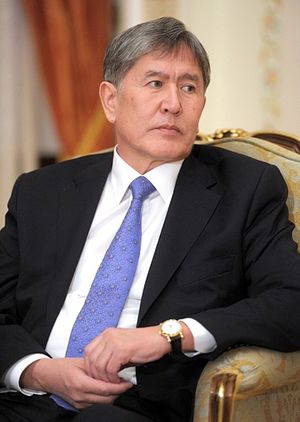This week Kyrgyzstan marks six years since the 2010 revolution that swept Kurmanbek Bakiyev from power and made way for the presidency of Almazbek Atambayev. On Monday, Atambayev signed a decree making April 7 an official holiday, “the Day of the People’s April Revolution.” For a country that had two popular revolutions in a decade, stability is always a prime topic. Although Kyrgyzstan stands apart from its regional neighbors in broad democratic terms, it’s likewise affected by corruption and economic problems, not to mention the lingering, lasting pains of revolution.
Last year, on April 7, Atambayev commemorated the revolution, saying “Today we can firmly say that the April revolution saved the country from economic collapse and spiritual impoverishment. It opened the way for the revival of Kyrgyzstan.”
At the time, I wrote:
Atambayev may say that the revolution saved Kyrgyzstan from “economic collapse and spiritual impoverishment,” but many are concerned about the direction the country is moving in both economically and politically. Kyrgyzstan is scheduled to join the Russian-led Eurasian Economic Union (EEU) in May. Russia’s recession, the consequence of western sanctions linked to Russian involvement in Ukraine and a simultaneous drop in energy prices, has spilled over into its Central Asian partners. The Asian Development Bank forecasts a decrease in Kyrgyzstan’s economic growth in 2015 and a rise in inflation. Meanwhile, democracy and human rights advocates in the country are increasingly nervous about the russification of Kyrgyz politics. A pair of laws are working their way through parliament–one would ban “LGBT propaganda” and the other, a “foreign agents law” would increase restrictions on NGOs. Both are modeled on Russian laws.
Kyrgyzstan may not have made quite the progress either of its revolutions were hoping for.After Atambayev’s speech, a small crowd gathered outside the White House to protest against his government.
Another year gone and many of the same questions remain at the forefront of regional observers’ minds. Kyrgyzstan joined the Eurasian Economic Union, but the benefits remain blurry and uneven. It’s too soon to tell whether the benefits, like the easing of rules of Kyrgyz migrant workers, are worth the downsides, like the collapse of the reexport business. But the external economic climate has not markedly improved, meaning the internal ramifications remain. In January 2016, the government said its GDP growth had slowed to 3.5 percent in 2015 from 4.0 percent the year before.
On the human rights front, advocates continue to worry. The same two laws–the “gay propaganda” law and the “foreign agents” law–are still floating around in legislative limbo, but they haven’t died. The state engaged in a handful of worrying measures–like declaring persona non grata and deporting the director of Human Rights Watch’s Bishkek office–but also managed to hold relatively clean parliamentary elections.
Recent events, however, bring up bad memories. The present administration may have rode the wave of revolution into office, but it’s not looking to be swept from it in the same fashion. In the final week of March, a border dispute with Uzbekistan flared at the same time local elections were being held. An opposition movement cancelled a planned rally after its leaders’ voices allegedly turned up in an audio recording discussing a coup. As Eurasianet reported, the security services arrested several opposition politicians:
Many have remarked that none of the quartet, which also comprises former Jalal-Abad regional governor Bektur Asanov and ex-lawmaker Kubanychbek Kadyrov, would have had even a remote chance of mounting a viable attempt to overthrow the government. Bigger fish are still at large, meanwhile.
As with many such incidents, it’s difficult to tell from afar how much is being inflated. Given Kyrgyzstan’s history, someone plotting a coup is entirely possible–it’s also possible that the incident is at best an overreaction on the part of the authorities and at worst a manufactured issued to discredit opposition. In fall 2017, Kyrgyzstan will hold presidential elections and the constitution bars Atambayev from running again.

































